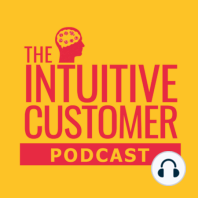26 min listen

Are You A Risk Taker?
FromThe Intuitive Customer - Helping You Improve Your Customer Experience To Gain Growth
Are You A Risk Taker?
FromThe Intuitive Customer - Helping You Improve Your Customer Experience To Gain Growth
ratings:
Length:
23 minutes
Released:
Jan 13, 2019
Format:
Podcast episode
Description
Are You a Risk Taker? We all have varying levels of risk tolerance. When we shy away from risk, we call that risk-aversion. This episode of The Intuitive Customer discusses the concept of risk aversion and how it affects customers’ behavior in your Customer Experience. People like sure bets better that come with less significant gains over risky ventures, even when the risky venture proposes a substantial benefit. We hate losing things. Losing things makes us much more upset than gaining things makes us happy. So, if we are risk-averse by nature then we must always be risk-averse, right? Not so fast. Human behavior is rarely predictable, and our behavior regarding risk is no different. There are exceptions and variables that can change our risk preferences. We discussed the four influences on our tolerance for risk in this episode. Four Influences on Our Tolerance for Risk: The presence of testosterone correlates with risk-taking. Research shows that when more testosterone is present in the body, people are more likely to engage in risky behavior. This correlation occurs in men and women alike. The way choices are presented changes our risk tolerance. We would rather hold on to what we have than commit to a sure loss. When decisions are framed in the context of gains, we choose the conservative options more often than the risky ones. However, when alternatives are framed in the context of losses, we will take more significant risks to avoid losses than when the options are framed as gains. This phenomenon is why bets get riskier at the horse track as the day wears on—and the losses pile up! The domain where the risk occurs affects our decisions. We might be willing to risk some of our hard-earned dollars at the track, but we are less likely to endanger things that are essential to our well-being, like our house or financial stability. The life stage we are at will affect our risk aversion. Depending on where you are in your life, and the related responsibilities that accompany that life stage will change how much risk you can tolerate. The chances you take as a young single person might be different than ones you take as a parent with a mortgage. People who are late in their career might be less willing to take on new areas than those who are just getting started. People who are close to retirement might not make the same investments as a kid opening their first retirement account, and so on. To find out how you can apply these concepts in you Customer Experience, please listen to this episode. The Intuitive Customer podcasts are designed to explain the psychological concepts behind customer behavior. As customer experience consultants, we see risk aversion show up in Customer Experience all the time. Listen in to hear how you can recognize risk aversion in your customers’ behavior and address it in your Customer Experience. If you would like to find out from one of our CX consultants how you can implement the concepts we discussed in your organization’s marketing to improve customer loyalty and retention, contact us at www.beyondphilosophy.com. To subscribe to The Intuitive Customer and never miss a podcast, please click here. Follow Colin on Twitter @ColinShaw_CX.
Released:
Jan 13, 2019
Format:
Podcast episode
Titles in the series (100)
Leading Your Customer To The Right Choice: An interview with Professor Jeff Parker on his research on how you can lead your customers decision making by The Intuitive Customer - Helping You Improve Your Customer Experience To Gain Growth